- Home
- Catherine Spencer
The Moretti Marriage Page 8
The Moretti Marriage Read online
Page 8
“And were you successful?”
“No. She still insists it’s just stress that’s making her so antsy, and that she’ll be fine once all the fuss and folderol is over. But you and I both know that’s not the case.”
“Indeed not. She is in turmoil.” And frighteningly close to breaking point, as he’d realized yesterday morning when he’d drawn her into his arms. Her body had been racked by fine tremors, not easily detected by the naked eye, perhaps, but impossible to miss upon close physical contact. She was as fragile as thistle-down in a breeze, likely to fall apart without notice. And he wasn’t helping matters. “Unfortunately, Jacqueline, I don’t think she’ll be any more forthcoming with me.”
“But that’s not why I’m calling. No, the problem is, my car’s still being serviced and won’t be ready until closer to five-thirty—something to do with the air-conditioner not working. But Chloe’s stranded at the town house and expecting me to pick her up around four. I can’t call her, because she accidentally left her cell phone in my car, and the telephone isn’t hooked up at the new place yet.”
“So you would like me to pick her up and take her home, is that it?”
“Oh, if you could, it would really help. I’ve got a hairdressing appointment in ten minutes, followed by a list a mile long of other things I still need to get done, and time’s slipping away at an alarming rate. But I’ve borrowed a courtesy car, and could run most of my errands if I didn’t have to worry about meeting her on time.”
“Consider it done.” He fished a pen from his inside pocket. “What’s the address?”
She rattled off directions, which he scribbled on the back of the restaurant bill, told him he’d saved the day, and hung up.
“But who will save the bride?” he wondered aloud, dodging the traffic as he crossed the street to the tall office building on the other side.
Making his way through the crowd in the lobby, he rode the elevator to the fifteenth floor and strode down the hall to where a heavy glass door bore the NM-Internazionale logo. Even after two years, seeing it still gave Nico a thrill. Success and money were things he never took for granted.
Donna Melino, his Vancouver-based shipping broker, met him in the reception area. “Nico, we’ve got big trouble,” she greeted him, something he’d already figured out from the look on her face. Normally unflappable, she was clearly agitated.
“Come into the office,” he said sharply in Italian, conscious that the receptionist and junior assistant were all ears and wide, curious eyes. “Whatever it is, there’s no need to advertise it to the whole world.”
“I’m sorry,” she said, once the door was closed and they had complete privacy. “I didn’t mean to be indiscreet, but I’m afraid I’m in a bit of panic.”
“I’d never have guessed!” He filled a glass with ice water from a carafe on the credenza and handed it to her. “What happened? Another foul-up on the docks? A shipment not coming in on schedule?”
“Worse.” She held the side of the glass against her flushed cheek and closed her eyes. “That container ship you purchased—”
“What about it?”
“The sale’s fallen through. I just heard from Bob Holmes, the vendor’s agent. They can’t deliver, after all.”
“What the devil do you mean, they can’t deliver, after all? They damned well have to! They signed a contract!”
She flinched at his subdued roar, and looked at him wearily. “Try telling that to Mr. Holmes, Nico. He’ll be here momentarily. I warned him up front that he’d be dealing with you on this one.”
He paced the floor, struggling to keep his anger under control. But the ramifications of the situation went far beyond a sale gone sour. He stood to lose money—a lot of money—and perhaps more important, a reputation he’d worked hard to earn.
The prospect brought out the street fighter in him. On the surface, he might look like an executive in his tailored Italian suit; a man of moderation and reason, who never got his hands dirty. But inside, something of the boy he’d once been still remained. He remembered how it felt to be cheated.
He’d been fifteen, the first time it happened. For months, he’d saved his earnings from delivering groceries and running errands for the neighborhood merchants, all so that he could afford a Polaroid camera. His plan had been to photograph tourists and sell them instant pictures of their time in Verona. Even then, he’d been an entrepreneur.
For two weeks, he’d tasted success beyond his wildest expectations. And then, in the space of time it took for him to hand over a print of an elderly couple standing on the Ponte Pietra, a youth raced past and snatched the camera. Nico had given chase and caught the thief, a boy of about seventeen, both taller and heavier than he’d been at the time, but he hadn’t let that deter him.
The scuffle had been brief but furious. He’d retrieved his prized possession and left his adversary bleeding in the gutter. What he hadn’t known was that the kid belonged to a gang of four whose specialty was petty crime. The other three had come after him that evening, and this time the fight was longer and more vicious. He went home with a black eye, a bloody nose, and a cracked rib. But he left the others with three missing teeth, and two split lips among them, as well as enough scrapes and bruises to keep them howling for a week.
After that, word had spread: don’t mess with Nico Moretti. It was a lesson Signor Holmes was about to learn.
“Make sure, when he arrives, that we’re not interrupted,” he instructed Donna grimly. “In fact, why don’t you and the office staff leave early for once? Go to Stanley Park and enjoy the sunshine.”
“Nico, you’re not a juvenile, sorting out your grievances in the back streets of Verona, and let off with a slap on the wrist if you play rough,” she warned.
“You’re absolutely right, Donna, la mia amica. I’ve learned a thing or two since those days. Don’t worry. Signor Holmes will walk out of here unaided—but he’ll be sweating when he does so.”
Although heat still hung heavy in the air, the afternoon had turned overcast, with ominously dark clouds scudding in from the west and banking steeply against the Coastal Range. A summer storm, Chloe thought, surveying the small, enclosed garden behind the town house. The landscape architect had proposed elaborate plans for creating the illusion of space there, with clever plantings around the patio, and a miniature waterfall trickling down the back wall into a raised pond.
Poor man! He’d become somewhat irritated by her lack of enthusiasm for the project. She should have explained that nothing much held her interest anymore—nothing, that was, except the forbidden subject of Nico Moretti.
The first fat raindrops, forerunners of the deluge shortly to follow, left black spots the size of dimes on the pale stone of the patio. Lightning flickered over the distant mountains.
Going back into the house, Chloe rinsed out her water glass at the kitchen sink, and glanced again at her watch. Almost five-fifteen. Her mother was over an hour late, probably caught up in traffic, with commuters trying to beat the storm as they headed home, but it was unlike her not to phone.
Restlessly, Chloe wandered from room to room, squaring a cushion here, straightening a painting there, but bypassing the master suite with its connotations of married intimacy. Baron had been gone two days, and she had not missed him once. She didn’t want to think of sharing a bed with him. Couldn’t afford the time. There was too much to do between now and Saturday.
A quarter to six, and still no sign of her mother. What could be keeping her?
Giving the towels in the guest bathroom one last twitch, Chloe returned to the second floor sitting room where she’d left her purse. Jacqueline hated talking on the phone when she was driving; said she found it too distracting. But the storm was right overhead now, turning the evening prematurely dark, and Chloe was beginning to worry.
From the window, she could see past the courtyard complex to the road. Cars swished by, their headlights throwing a bright arc ahead of them, water spraying fountai
n-like from beneath their tires. The wail of sirens a block or so away competed with the intermittent crack of thunder. Like it or not, Jacqueline was about to take a call.
Chloe was still rooting around in her bag for her phone when the doorbell finally rang. “Thank God!” she muttered, and ran down to the main floor foyer to let her mother in.
Instead, she found Nico on the doorstep, his expression as dark as the weather. The rain dripping from his hair joined that already staining the shoulders of his pale gray suit. The knife-sharp pleat down the front of his pants had softened to a gentle curve. “Merda!” he grumbled, unceremoniously pushing his way past her. “How do you live in such a climate?”
“Nice to see you, too,” she retorted, furious at the way her entire body leaped with sensual awareness at the sight of him. The tumult in her stomach alone was enough to leave her feeling faint, and never mind other, less decorous parts that fairly throbbed with delight. “And just for the record, no one asked you to stop by, so don’t bother taking off your jacket.”
Ignoring her, he hung it on the brass coatrack and surveyed his shoes grimly. “Save your sweet welcome for someone else, Chloe. I’m not here to make myself at home. Jacqueline sent me.”
“Why isn’t she here herself? What’s happened to her?”
“Nothing but a slight inconvenience, which is more than I can say for my shoes. They’ll never be the same again. Remind me to wear hip waders, the next time I visit Vancouver.”
“Stay away from Vancouver, and you won’t have to bother,” she said, barring his way when he went to climb the stairs. “And what do you mean by a slight inconvenience?”
“She had problems with her car, and was delayed. I had expected to be here much earlier, but I, too, had other matters requiring my attention. I’m sorry if you were alarmed.”
“She should have phoned and let me know. I could have taken a taxi home.”
“I wish that had been possible. I have better things to do than chauffeur such an ungrateful passenger more than fifty kilometers past the city limits. But if you’d tried using your phone, you’d have realized why it was impossible for her to do as you suggest, since you don’t have it with you. Jacqueline found it in her car, after she’d dropped you off at your office. So, instead of throwing up obstacles at my every word, why don’t you behave like the gracious hostess you were brought up to be, and offer me something to dry off my hair? Your mother would be scandalized if she saw how you’re treating your guest and savior.”
Some savior! He threatened everything Chloe held dear: peace of mind, stability, security…all the things she’d fought so long and hard to achieve and thought were so vital to her happiness, but which, since he’d barged back into her life, didn’t seem so important, after all.
“I’ll go get you a towel,” she said, being anything but gracious because that was the only way she could arm herself against him. “And you wait here.”
Once again though, he ignored her, as she discovered when, towel in hand, she turned to leave the powder room on the second floor, and found him blocking the doorway. “Very elegante,” he decreed, eyeing the black toilet and washbasin, gold faucets and towel rail, and deep burgundy walls appraisingly. But the mockery in his tone suggested he found the overall effect amusing, rather than chic.
“We like it.”
“Do you?”
She flung the towel at him. “Yes!”
“Buono.” He cast around another wry glance. “At least someone appreciates it.”
Seething, she watched as he took his sweet time mopping his hair and finger-combing it into some sort of order. The sooner they were on the road, the safer she’d be.
But he quickly dashed that hope. “Grazie,” he said, handing back the towel, then stood there regarding her expectantly.
“Now what?” she snapped, just about at the end of her rope.
“Aren’t you going to give me the grand tour of this place you claim to like so much?”
“Certainly not,” she said, wishing he’d move. The powder room was never meant to accommodate two people, especially not when one of them was his size. He was stealing so much air, she could hardly breathe. “You’re going to drive me home. Now!”
“Not as long as this rain lasts. I had to park over two blocks away, and you’ll get soaked running to the car.”
“So what? I won’t melt.”
“But I might, especially if you keep shooting sparks at me from those beautiful blue eyes.”
“Stop it, Nico,” she said, her voice quivering almost as badly as her insides. “We aren’t going to do this again.”
“Do what, tesoro? All I’m suggesting is you show me your new home while we wait for the rain to pass. What did you have in mind?”
“Absolutely nothing,” she replied, exhausted with his taunting. It was easier to give in than try to match wits with him. And agreeing to show him the rest of the unit at least meant they wouldn’t both be crammed in the smallest room in the house. “If a tour’s that important to you, a tour is what you’ll get. Follow me.”
He did, more closely than he needed to, so that the scent of him—wet hair faintly spiced with whatever shampoo he’d used that morning, a lingering trace of aftershave, and summer-fresh rain—wafted around her in tantalizing invitation. Deciding the only way to resist falling under its spell was to keep three steps ahead of it, she fairly raced him through the various rooms and levels.
“That’s it,” she told him, winding up in the kitchen, five minutes later. “Everything there is to see. Satisfied?”
“I don’t have to be,” he replied, trapping her in his molten gaze. “I’m not the one who has to live here. But if I were faced with such a choice, I tell you plainly that I’d rather live in a tent than find myself cooped up in this tall, sterile chimney of a home, with so many stairs, and rooms so small.”
“Considering where you grew up, I’m surprised you can afford to be so critical,” she shot back, miffed. “As I recall, you and your sisters lived above a shop, in only four rooms, all of them tiny. You showed me where you slept as a boy, in an alcove off the kitchen.”
“Because my parents were poor and after my father died, that was the best my mother could provide for us. But the windows on one side looked out on a street alive with color, and on the other to the Adige river. And there was such love and laughter under that roof that we never missed the luxuries so important to those born with a silver spoon in their mouths. But what do you have here, Chloe, apart from a high-rent address?”
He shamed her with his answer; made her feel shallow and pretentious. Looking at the house through his eyes, she saw that “sterile” suited it very well. Everything was too pristine, too perfect, and the total effect completely devoid of soul.
“It’s different for us,” she explained, trying to justify the sleek Art Deco furniture, the efficient stainless-steel appliances. “Baron and I are out at work all day. We’ll spend only the evenings and weekends here—and even then, not always. We didn’t want a place that required a lot of upkeep. Our whole aim was to be able to lock the door and go away, without having to worry about hiring a house-sitter to water plants or feed a dog.”
“Just as well.” He shot a disparaging glance at the three feet of floor between kitchen counter and breakfast nook. “Even a small dog could not be happy here.”
“It’s an adult-oriented unit, not intended for dogs or young families.”
“Adult-oriented, hmm?” He studied her, his gaze sweeping her from head to toe. “Is that why you’re choosing to leap into middle age?”
“Middle age?” she choked. “What the hell do you mean by that?”
He shrugged insolently. “Well, how else would you describe yourself, all neatly repressed in your lawyer’s stark black power suit, with your hair scraped back into a breakfast bun, and your eyes so empty that you might as well be dead?”
Another brilliant flash of lightning struck, occurring almost simultaneously with a deafening cr
ack of thunder, and a second later the lights went out, throwing the area into gloomy relief. Rain pelted the skylight at the top of the stairs.
“I don’t know what’s put you in such a sour mood today, Nico,” she told him, raising her voice above the din, and choosing to rise above the urge to stab him with a kitchen knife. “If it’s having to go out of your way to pick me up, I apologize. But if you can’t find something positive to say about my new home—or me, for that matter!—I’d just as soon you didn’t say anything at all.”
He wiped his hand down his face and sighed. “You are right, cara. I am not being kind. The truth is, I had an unpleasant afternoon, but that is no reason to behave badly toward you.”
Hearing the weariness in his tone, she softened. “Something to do with business?”
“Everything to do with business.” He shook his head and stared out at the dismal afternoon. “Sometimes, I think I was happier when I was poor and thought I had nothing. I seldom lost sleep over that.” His shoulders lifted in another shrug, this one laden with self-deprecation. “Of course, when it was too late, I learned that I had more than any other man on earth, and realized the true depth of loss—but that’s another story, one with which you’re already familiar.”
“What happened this afternoon?” she said, steering him away from the personal and back into the much safer waters of the professional.
“A sale I had thought was final didn’t come to pass.”
“Something big?”
“A ship, Chloe. Your once-impoverished ex-husband already owns six, and had fancied himself about to acquire a seventh.”
“Ships?” No amount of self-discipline could hide her astonishment or stop the gauche reply falling out of her mouth. “Good grief, Nico, you must be filthy rich if you can afford to buy ships!”
He almost smiled. “I suppose I am.”
“Ships…!” Try as she might, she couldn’t shake the astonishment from her voice—or quite wrap her mind around the fact that he’d managed to parlay risky, small-time ventures into a successful world-wide enterprise.

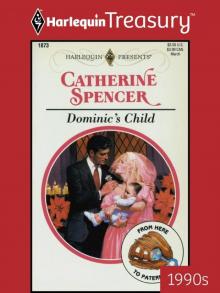 Dominic's Child
Dominic's Child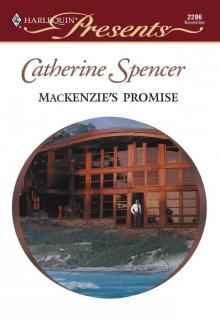 MacKenzie's Promise
MacKenzie's Promise The Moretti Marriage
The Moretti Marriage The Italian s Convenient Wife
The Italian s Convenient Wife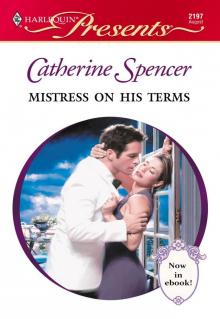 Mistress on His Terms
Mistress on His Terms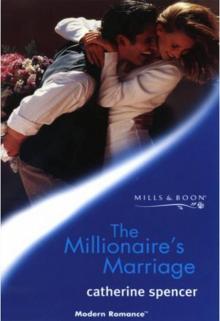 The Millionaire's Marriage
The Millionaire's Marriage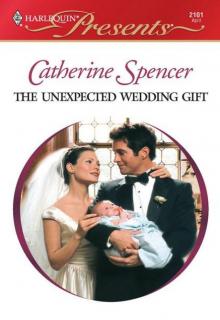 The Unexpected Wedding Gift
The Unexpected Wedding Gift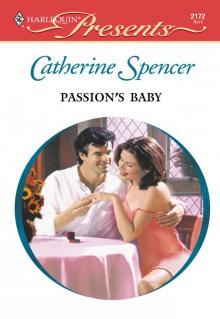 Passion's Baby
Passion's Baby The Italian's Secret Child
The Italian's Secret Child Constantino's Pregnant Bride
Constantino's Pregnant Bride The Pregnant Bride
The Pregnant Bride Christmas With A Stranger_Forbidden
Christmas With A Stranger_Forbidden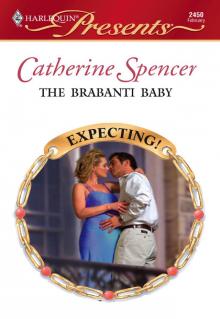 The Brabanti Baby
The Brabanti Baby Convenient Brides
Convenient Brides The Italian Doctor’s Mistress
The Italian Doctor’s Mistress The Secret Daughter
The Secret Daughter The Costanzo Baby Secret
The Costanzo Baby Secret The Doctor's Secret Child
The Doctor's Secret Child A Nanny in the Family
A Nanny in the Family D'Alessandro's Child
D'Alessandro's Child In the Best Man's Bed
In the Best Man's Bed